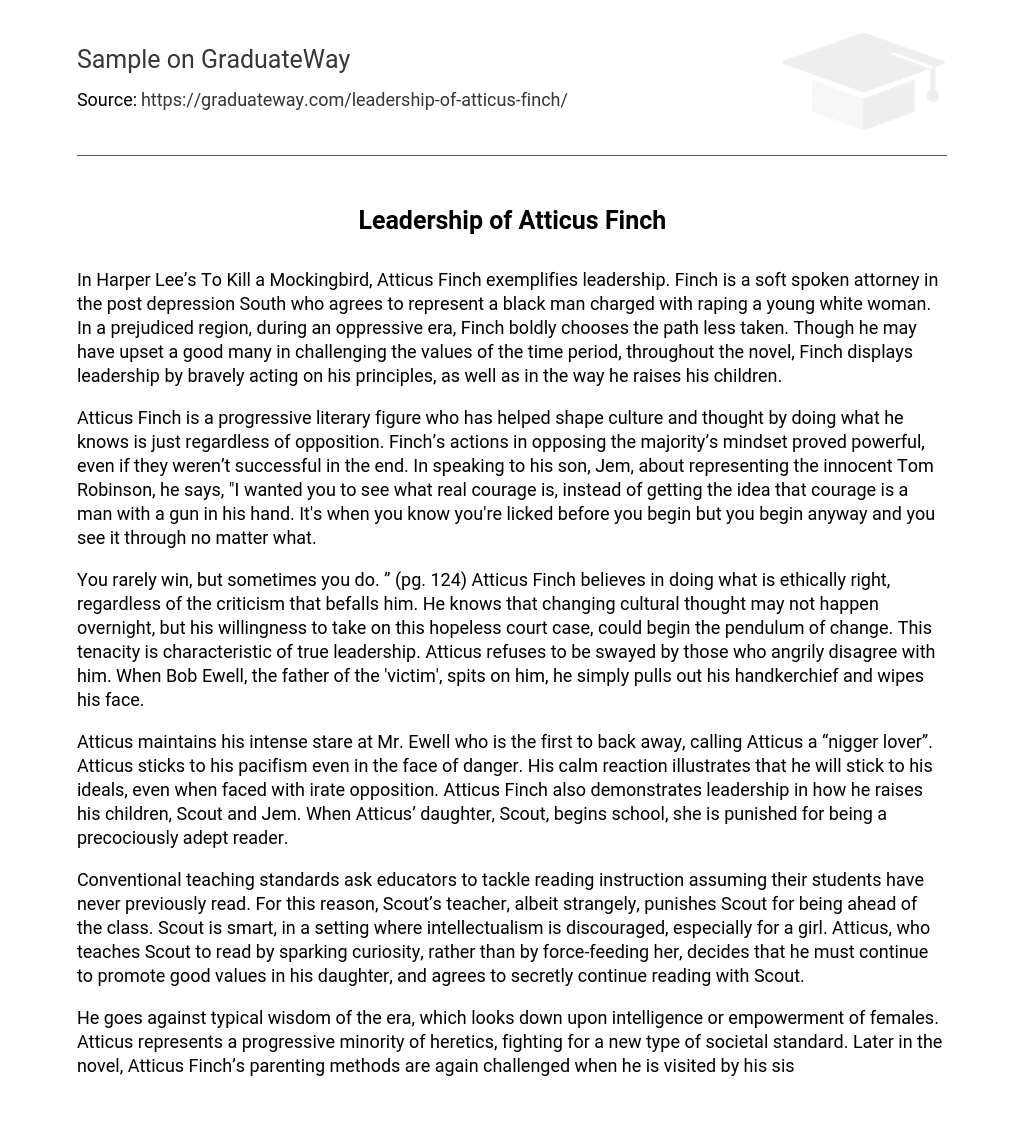Harper Lee’s To Kill a Mockingbird showcases Atticus Finch as a leader. As a calm attorney in the post-depression South, Finch chooses to defend a black man accused of raping a young white woman. Despite the prejudice and oppression of the era, Finch courageously takes this unconventional stance. Although he may have challenged prevailing norms and values, throughout the book, Finch exhibits leadership by fearlessly standing by his beliefs and in his parenting approach.
Atticus Finch is a progressive literary figure who has played a significant role in shaping culture and thought by standing up for what he believes is right, despite facing opposition. Although Finch’s efforts to challenge the majority’s mindset may not have ultimately succeeded, they were still impactful. When discussing his decision to defend the innocent Tom Robinson with his son Jem, he explains the true meaning of courage: “I wanted you to understand what true courage is, rather than thinking it involves a man holding a gun. It is the ability to persevere and follow through despite knowing that you may be defeated from the start.”
Atticus Finch, in Harper Lee’s To Kill a Mockingbird, believes in upholding ethical principles, even in the face of criticism. He understands that societal change takes time and is willing to take on an apparently hopeless court case as a starting point for such change. This unwavering determination reflects his true leadership qualities. Atticus stands firm against those who vehemently oppose him, as demonstrated when Bob Ewell, the father of the alleged victim, spits on him. Instead of retaliating, Atticus calmly retrieves his handkerchief and wipes his face.
Atticus remains steadfast in his unwavering gaze at Mr. Ewell, who is the initial individual to retreat, hurling the derogatory term “nigger lover” at Atticus. Even in the presence of peril, Atticus adheres to his commitment to nonviolence. His composed response showcases his determination to adhere to his principles despite encountering furious resistance. Moreover, Atticus Finch showcases leadership through his approach to raising his children, Scout and Jem. Upon Scout’s enrollment in school, she is reprimanded for her exceptionally advanced reading skills.
Conventional teaching standards dictate that educators must approach reading instruction as if their students have no prior experience with reading. Consequently, Scout’s teacher, despite oddities, reprimands Scout for being more advanced than her classmates. In an environment that discourages intellectualism, particularly for girls, Scout exhibits intelligence. Atticus, Scout’s father, teaches her to read by fostering curiosity rather than through coercion. Recognizing the importance of instilling positive values in his daughter, Atticus clandestinely agrees to continue reading together with Scout.
Atticus challenges the prevailing belief of the time, which disdains intellect and empowerment of women. He represents a progressive minority that fights for a new societal norm. In a later part of the book, Atticus’ parenting techniques face further opposition when his sister, Aunt Alexandra, visits him. She expresses her indignation at Atticus’ upbringing of Scout and Jem, especially in her attempts to impose feminine customs on Scout.
Scout’s aunt insists on her wearing a dress and prohibits her from playing with her male friends. Atticus, once again, supports his own decisions and denies his sister any control over how his children are raised. He refuses to conform to the idea of molding Scout into a typical lady who lacks the urge or intention to engage in activities that require wearing pants (pg. 81). Instead, Atticus desires Scout to be nurtured by her own curiosity and aspirations, allowing her unique personality to take shape, rather than conforming to preconceived societal norms dictating women’s behavior.
For raising his children against social norms, allowing them to grow freely and naturally, and resisting opposition to his unorthodox values, Atticus exemplifies leadership. In the novel, Atticus consistently demonstrates the traits of a leader. He holds progressive values and ideals that are ahead of his time. Atticus champions equality for women and blacks, along with advocating for pacifism and humility. However, what truly defines Atticus as a strong leader is his unwavering determination to uphold his principles even in the face of opposition from the residents of Maycomb County.
According to the text, Atticus demonstrates true bravery by starting even when he knows he will not succeed. (pg. 124) He embodies leadership by displaying this courage consistently throughout the book. Atticus paves the way for change through his progressive beliefs and unwavering determination, serving as a role model for both his children and the people of Maycomb County. In To Kill a Mockingbird, Atticus emerges as a strong leader who inspires readers and fosters a shift in their perspectives.





